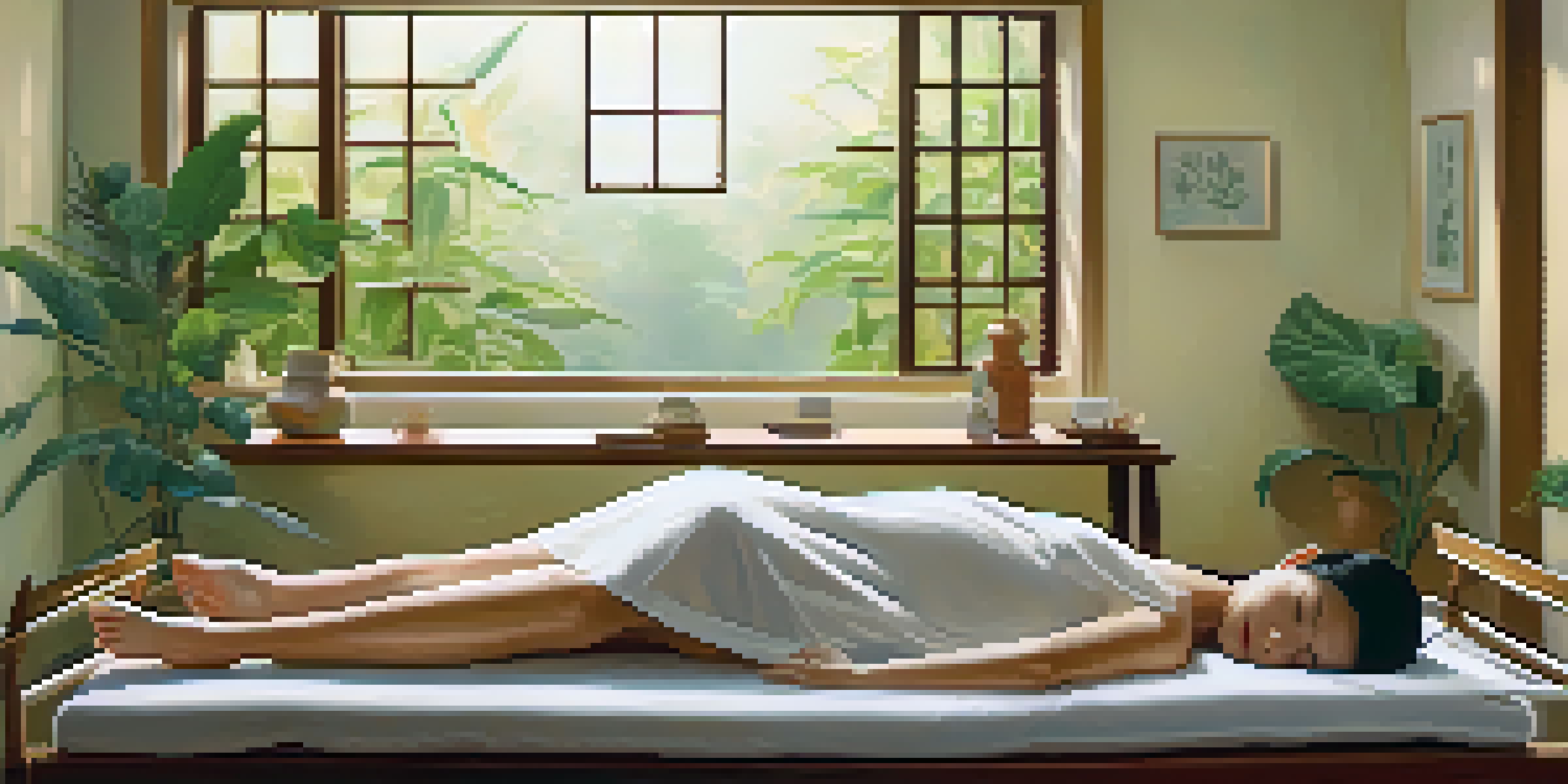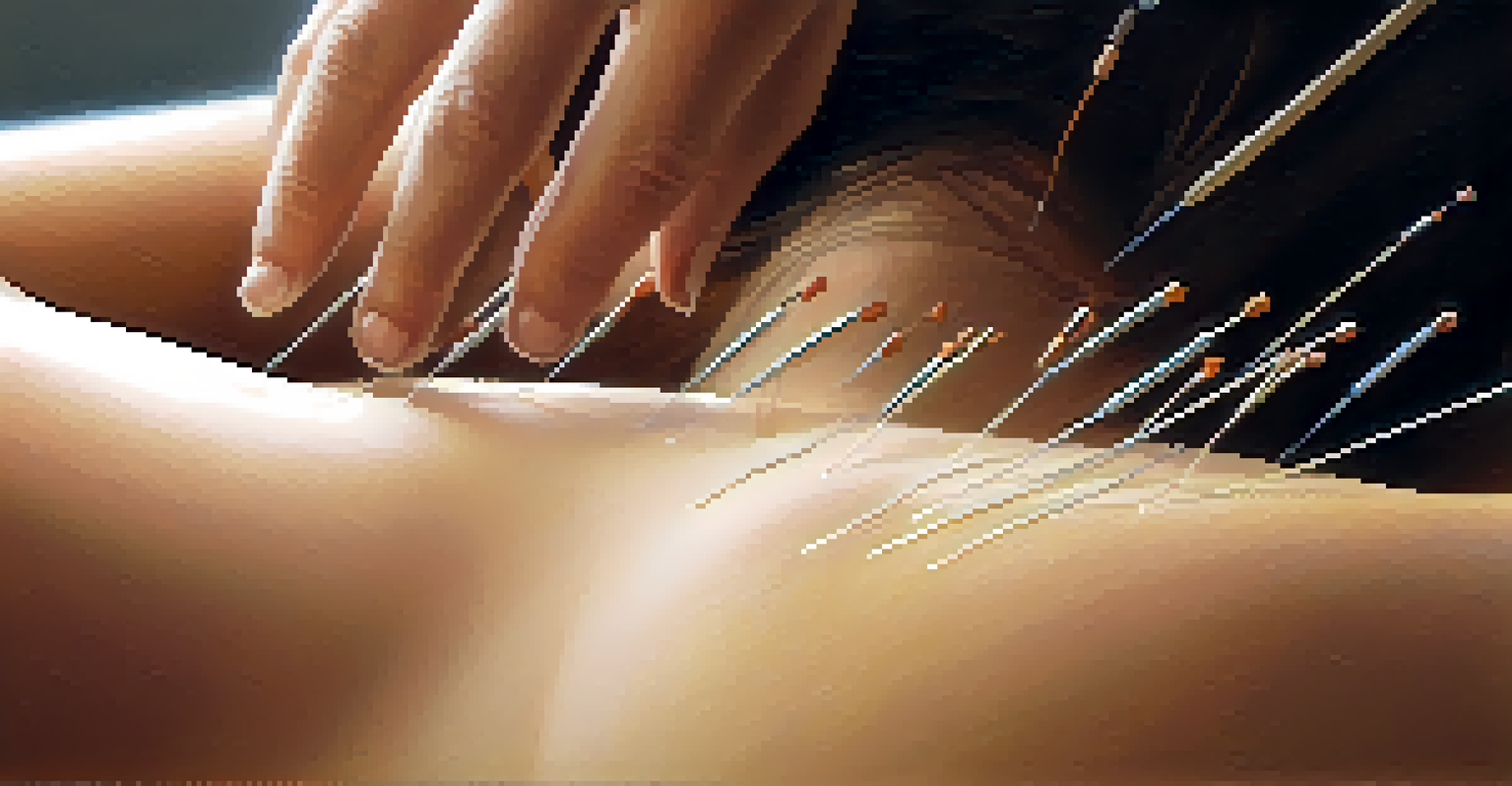Integrating Acupuncture into Holistic Health Routines

Understanding Holistic Health and Its Importance
Holistic health focuses on the complete individual, addressing physical, emotional, and spiritual well-being. Instead of treating symptoms in isolation, it recognizes the interconnectedness of all aspects of life. This approach not only targets immediate concerns but also promotes long-term wellness and balance.
The greatest wealth is health.
Incorporating practices like acupuncture can significantly enhance holistic health routines. By stimulating specific points on the body, acupuncture aims to restore harmony and improve the flow of energy, or 'qi.' This can lead to better mental clarity, reduced stress, and overall improved health.
Ultimately, holistic health encourages individuals to take charge of their well-being. By integrating various modalities, like acupuncture, you can create a personalized health routine that nurtures your entire self, fostering a more vibrant and fulfilling life.
What Is Acupuncture and How Does It Work?
Acupuncture is an ancient Chinese practice that involves inserting thin needles into specific points on the body. These points correspond to pathways of energy known as meridians. By stimulating these points, acupuncture seeks to balance the body's energy and promote healing.

The practice is based on the belief that imbalances or blockages in energy flow can lead to various health issues. For instance, if someone struggles with anxiety, acupuncture can help alleviate symptoms by restoring emotional equilibrium. This makes it a valuable tool in holistic health.
Holistic Health Emphasizes Wholeness
Holistic health focuses on the complete individual, integrating physical, emotional, and spiritual well-being for long-term wellness.
Many people find acupuncture to be a gentle and effective way to support their health. Aside from physical ailments, it can also assist in emotional and mental wellness, making it a well-rounded addition to any holistic health routine.
Benefits of Acupuncture for Holistic Health
Acupuncture offers numerous benefits that align perfectly with holistic health principles. For starters, it can reduce stress and anxiety, promoting a sense of calm and well-being. This is particularly beneficial in today’s fast-paced world, where mental health is often compromised.
Acupuncture is a method of encouraging the body to promote natural healing and to improve functioning.
Moreover, acupuncture has been shown to alleviate chronic pain, making it an excellent adjunct for those dealing with conditions like arthritis or migraines. By addressing pain at its source, it can help individuals regain mobility and improve overall quality of life.
Additionally, acupuncture supports digestive health, enhances sleep quality, and boosts the immune system. These benefits illustrate how acupuncture can harmoniously fit into a holistic routine, addressing multiple aspects of well-being simultaneously.
How to Incorporate Acupuncture into Your Routine
Integrating acupuncture into your holistic health routine can be straightforward and rewarding. Start by scheduling regular sessions with a certified acupuncturist who understands your health goals. This professional guidance ensures you receive tailored treatment that aligns with your specific needs.
Consider combining acupuncture with other holistic practices such as yoga or meditation. For example, after an acupuncture session, practicing mindfulness can further enhance relaxation and stress relief. This synergy deepens the benefits of both practices, creating a more comprehensive wellness experience.
Acupuncture Enhances Well-Being
Acupuncture promotes healing by balancing the body's energy, effectively addressing both physical and emotional health issues.
Lastly, keep track of your progress and how you feel over time. This reflection will help you understand the impact of acupuncture on your health, allowing you to make informed adjustments to your routine as needed.
Common Misconceptions About Acupuncture
Despite its growing popularity, several misconceptions about acupuncture still persist. Many people worry that the needles will be painful, but in reality, most patients report feeling minimal discomfort or none at all. The needles are incredibly thin, and the sensation is often described as a slight tingling or warmth.
Another common myth is that acupuncture is only effective for physical ailments. While it does work wonders for pain relief, it also plays a significant role in emotional and mental health, supporting conditions like depression and anxiety. This holistic approach can be surprising for newcomers.
Finally, some believe that acupuncture is a quick fix. While many experience immediate relief, the best results often come from ongoing treatment as part of a comprehensive health plan. Understanding these misconceptions can help people embrace acupuncture as a valuable component of their holistic health journey.
Finding the Right Acupuncturist for You
Choosing the right acupuncturist is crucial for a successful experience. Look for licensed practitioners with good reviews and credentials to ensure you're receiving quality care. Personal recommendations from friends or family can also guide you toward a trustworthy provider.
During your first visit, don’t hesitate to ask questions about their methods and experience. A good acupuncturist will take the time to understand your health history and personal goals, establishing a comfortable and trusting environment. This rapport is essential for effective treatment.
Choose the Right Acupuncturist
Selecting a licensed and trusted acupuncturist is vital for successful treatment and maximizing the benefits of acupuncture in holistic health.
Lastly, trust your instincts. If you feel comfortable and understood, you’re more likely to benefit from the sessions. Finding the right acupuncturist can significantly enhance your holistic health journey, making the experience both enjoyable and transformative.
The Future of Acupuncture in Holistic Health
As interest in holistic health continues to grow, acupuncture is gaining recognition as a valuable therapeutic option. Research supporting its efficacy is expanding, with more studies validating its benefits for various conditions. This trend is encouraging both practitioners and patients to explore its potential further.
Moreover, acupuncture is increasingly being integrated into mainstream healthcare settings. Hospitals and wellness centers are beginning to offer acupuncture as part of comprehensive care plans, showcasing its value alongside conventional treatments. This shift emphasizes the importance of a multidisciplinary approach to health.

Looking ahead, the future of acupuncture appears bright. As more people seek integrative solutions for their health, acupuncture will likely play a crucial role in shaping holistic health routines, promoting a more balanced and healthy lifestyle for many.